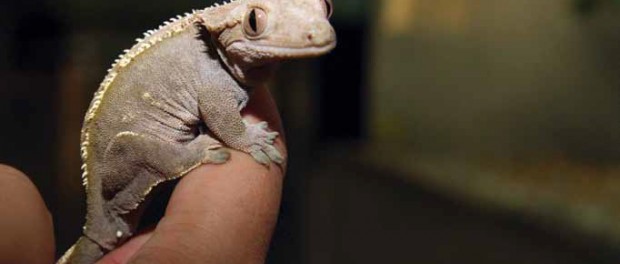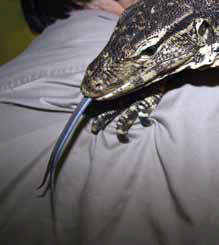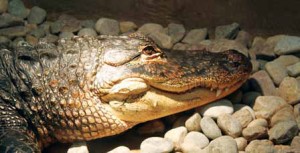Reptilia Zoo and Education Centre
What a surprising delight!

A legless lizard and a snake with feet—who would have thought? That is just some of what I learned about on my recent visit to the Reptilia Zoo and Education Centre.
I wouldn’t say I have a phobia of reptiles, but I certainly wasn’t jumping for joy at my impending encounter with more than 250 reptiles, amphibians and arachnids on display at the 25,000-square-foot facility. Like many, the thought of the texture of snakes, frogs and lizards, and the quick movements of spiders, made me less than eager to start my journey. However, those squeamish feelings and fears were soon dispelled during my tour, directed by Dr. Andre Ngo, Director of Research and Curriculum; and Chuck Cohen, Educator and Program Director (and a retired secondary science teacher).
The tour was very enlightening in regard to how many subjects can be covered and lessons learned through reptiles, the most obvious being the reptiles’ role in the food chain and the natural self-protection attributes and survival methods used by various species. More intriguing to me are the examples of competitive exclusion displacement, where different species share the same living space, yet compete and manage to survive together. We touched on bioaccumulation, such as how diet can change the toxicity of the poison released by species such as the black poison dart frog. And I learned that the yellow and white python I saw is actually a product of albinism; that the Cape Monitor lizard has the ability to count; and that the monocled cobra’s expanded hood actually occurs through the elongation of its ribs. So many interesting facts and features about reptiles that I would never have known, if it hadn’t been for my visit to Reptilia.
My tour guides took some of the reptiles out of their locked habitats, which gave me the opportunity to interact with the critters up close and personal. I stroked a lizard’s back (which felt like a beaded purse) and a turtle’s hard shell-patterned armour, and got to hold the cutest little gecko, no bigger than my hand. This seems to be one of Reptilia’s main objectives: to provide visitors with a real connection that leads to a better understanding of and appreciation for the reptiles and species. The middle of the exhibit even has a glass wall that allows visitors to observe veterinarians as they conduct checkups on the reptiles.
Reptilia offers extensive education programs for students of all grades. It finds ways to enrich the Grades 9–12 Ontario Science curriculum, but will also customize tours and programs that use the reptiles as ideal discussion starters for subjects such as geographical topics and issues, or as subjects for life drawing and photography. Its intriguing creatures are used to captivate the students as well as to introduce and reinforce the concepts they are learning in class, prompting students to ask their own questions and apply what they have learned to the world around them. Through interaction with living reptiles, Reptilia lessons not only provide a concrete application of abstract concepts, but also encourage a greater understanding of how we, as human beings, fit into the big picture.
Some specific secondary school topics that have been covered by Reptilia include native species and conservation; introduction to ecology; biodiversity—species and genetics/methods of measurement; individuals, communities, populations and ecosystems; food webs and energy flow; competition, parasitism and mutualism (some of the ways in which organisms can interact); invasive species; human impacts on the environment; and drift, bottlenecks, mutation and selection (a look at the different causes of diversity and change).
Reptilia offers all audiences an opportunity to learn more about the world of reptiles. And to ensure no one is excluded, they even offer a phobia course. The four sessions, each one hour long, are designed with the hope that by the end, frightened participants will be able to interact with the subject of their fear with a new perspective. The facility also offers tours designed for special needs students, which have shown very positive results.
Currently, Reptilia’s only location is in Vaughan; however, if that is not easily accessible, arrangements can be made to visit your school. Reptilia has also made many pairings with local libraries so that schools all over the province can get a chance to participate in and experience the programs offered.
For more information on Reptilia, visit www.reptilia.org. To book an educational program, call 905-303-2516. Also, don’t forget to ask about Reptilia’s Teacher Appreciation Day.





Leave a comment